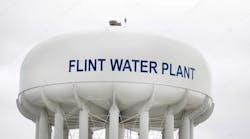The only time – so far as I know – that we ever scooped a major national news magazine was in January 2016, when we wrote about the Flint MI water crisis nearly a week before the story appeared on that magazine's cover.
Flint was, at the time, an economically depressed city with a population of approximately 100,000. It is located on the Flint River in Genesee County and, until 2014, the county bought its water from Detroit, 66 miles away, which took it from Lake Huron. Reportedly to save $19 million per year, the state had the county start taking its water from the adjacent Flint River.
Shortly thereafter, the residents noticed that the appearance, odor, and taste of the water had deteriorated and, although testing revealed the water contained high levels of lead and iron, it was months after learning the water was unsafe to drink before either the state or the U.S. Environmental Protection Agency (EPA) admitted the problem and took action. By then, there were cases where the lead levels had exceeded federal drinking-water standards by thousands of parts per billion, many children had lead poisoning, and the water was being blamed for cases of Legionnaire’s Disease.
In January 2016, a state of emergency for Genesee County was declared and members of the Michigan National Guard began distributing bottled water to residents. As a proud Hokie, I was pleased to note that it was a Virginia Tech engineering professor (Marc Edwards) researcher and his grad students who used the Freedom of Information Act to expose the cover-up by government officials. That, of course, wasn’t the end of the story. In a related Clark’s Remarks essay a year-and-a-half later, I noted that more than 8,000 Flint residents, many of whom were still drinking the bottled water provided by the National Guard, were being threatened with having their water service – which they could still use for washing and lawn watering – shut off for failure to pay their water bills.
In 2018, Michigan voters elected Dana Nessel to be their Attorney General. When she took office in 2019, she appointed Solicitor General Fadwa Hammoud and Wayne County Prosecutor Kym L. Worthy to lead a criminal investigation into the 2014-2016 Flint water crisis.
Although long overdue, it now appears that Flint residents may finally see some justice.
This month, as a result of that investigation, nine former Michigan officials, including ex-Gov. Rick Snyder, were all criminally charged. The most prominent, Snyder, was charged with two counts of Willful Neglect of Duty and was released from custody on $10,000 bond and the condition that he does not leave Michigan until his next hearing.
Others charged were Michigan’s former health director Nick Lyon, charged with involuntary manslaughter in the deaths of nine people who contracted Legionnaires’ disease from the tainted water; former Michigan Chief Medical Executive Dr. Eden Wells, also charged with nine counts of involuntary manslaughter and an additional two counts of misconduct in office and one count of willful neglect of duty; Richard Baird, a senior advisor to then-Gov. Snyder, charged with perjury, misconduct in office, obstruction of justice and extortion; Jarrod Agen, the former governor’s communications director, charged with perjury; Darnell Earley, state-appointed emergency manager, charged with two counts of misconduct in office; former emergency manager Gerald Ambrose, charged with multiple counts of misconduct in office; Howard Croft, Flint’s former director of public works, charged with two counts of willful neglect of duty; and Nancy Peeler, former manager of the early childhood section of Michigan’s Dept. of Health and Human Services, charged with two counts of misconduct in office and one for willful neglect of duty.
Although Flint has seemingly resolved its water crisis, and the affected residents are finally seeing justice served, clean water is still a major issue around the globe.
According to reliable scientific sources, some 785 million people worldwide (11 percent) lack access to safe drinking water and two billion people – 1 in 3 – lack access to improved sanitation. In fact, more than two million Americans live without access to safe drinking water or adequate sewer sanitation, water or adequate sewer sanitation. But there are ways that you and I can help.
Please check out these examples: https://water.org/solutions/ and https://www.globalchange.vt.edu/2020/06/22/krometis-clean-water-appalachia/.
##########
A regular contributor to HPAC Engineering and a member of its editorial advisory board since 2012, Clark, LEED AP, O+M, is a principal at Sustainable Performance Solutions LLC, a south Florida-based engineering firm focusing on energy and sustainability. Email him at [email protected].










